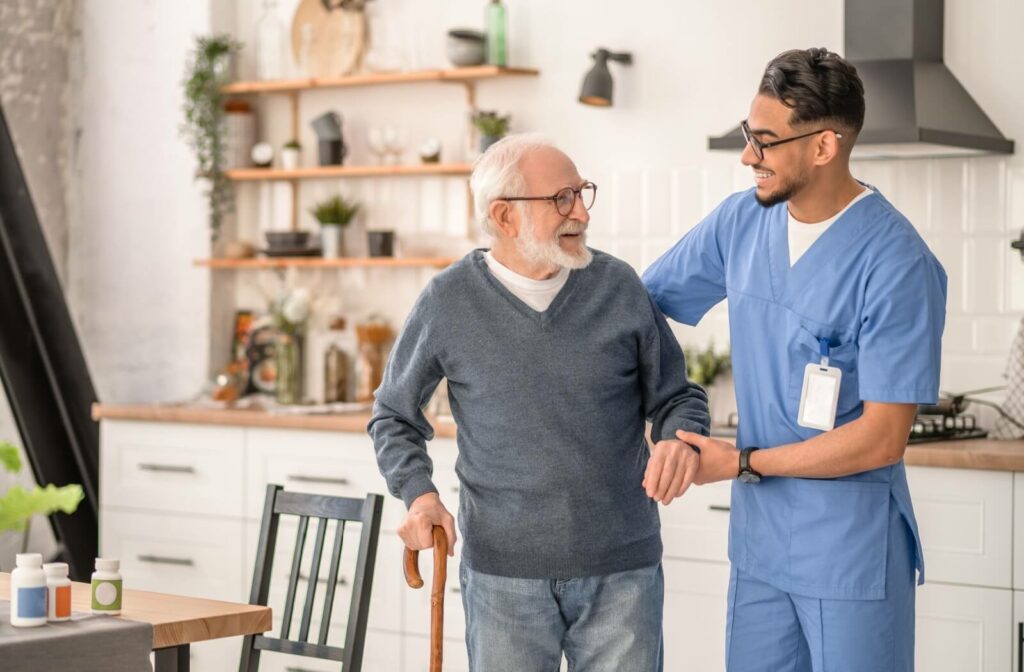Key Takeaways
- Assisted living supports seniors with limited mobility by providing safe, comfortable environments that promote independence.
- Common mobility challenges include arthritis, osteoporosis, muscle weakness, balance issues, neurological conditions, and recovery from injuries.
- Assisted living offers non-medical daily support like help with dressing, meals, and mobility, with care plans tailored to individual needs.
- Safety features in assisted living include wheelchair-friendly layouts, handrails, grab bars, non-slip flooring, and emergency call systems.
- Communities offer services like around-the-clock support, on-site health coordination, and respectful help with daily tasks to ease mobility-related stress.
Assisted Living and Mobility Challenges
Limited mobility can be challenging, but your family isn’t alone. If you have an older loved one living with mobility problems, assisted living can likely help. This lifestyle offers an environment built around providing safety and ease—without taking away a person’s independence.
These supportive spaces are thoughtfully designed with features that make daily life more comfortable while also offering freedom and dignity. Whether your loved one is managing arthritis, recovering from surgery, or simply facing the natural effects of aging, knowing there’s a place that can help makes all the difference.
Common Mobility Problems Seniors Face
Mobility changes are one of the most common age-related challenges. Aging can bring changes that make once-easy tasks more difficult or even unsafe. Some older adults begin to feel unsure on their feet, while others experience joint pain or limited range of motion.
This often develops due to:
- Arthritis, which can cause joint stiffness, pain, and limited flexibility
- Osteoporosis, which weakens bones and raises the risk of fractures
- Muscle weakness, which makes walking or standing for long periods harder
- Poor balance, increasing the chances of slips or falls
- Neurological conditions like Parkinson’s, which affect coordination and motion
- Recovery from injuries or surgeries that temporarily limit movement
Each of these affects a person differently. Fortunately, assisted living can help your loved one manage their daily life and stay independent, even when mobility is a challenge.
What Is Assisted Living?
Assisted living is a supportive type of senior living that’s built around the idea of balancing support with independence, safety with freedom. These communities are designed for older adults who may need help with certain daily tasks but still want to live as actively and independently as they can.
Unlike nursing homes, which are designed for full-time medical care, assisted living focuses on non-medical daily support. That might include help with dressing, meals, or mobility. Every person receives a care plan built around their unique needs, which can include extra support for mobility challenges. Assisted living offers just the right amount of assistance in a space that still feels like home.
Services and Support for Limited Mobility
In assisted living, seniors with mobility challenges can access a wide range of services that make daily life easier and more enjoyable. These services are designed to promote safety, convenience, and independence.
Accessible Living Spaces
One of the biggest benefits of assisted living is the safety features. Communities are specially designed to make every resident safe in their daily lives. To do so, assisted living communities offer features such as:
- Wheelchair-friendly apartments and shared spaces
- Elevators that connect all levels of the community
- Handrails in hallways and entryways
- Grab bars in bathrooms and showers
- Non-slip flooring throughout apartments and common areas
- Wide doorways and open layouts to improve navigation
- Emergency pull cords or call buttons for immediate assistance
These features are built right into the space, so support is always close without feeling intrusive.

Personalized Care Plans
No two residents are alike. That’s why assisted living communities create personalized care plans that take each person’s needs, preferences, and abilities into account.
For seniors with mobility challenges, this might include scheduled physical assistance with standing, walking, or transferring from place to place. It can also mean adjusting routines or apartment layouts to make daily life more comfortable.
Everything is designed to promote independence whenever possible while offering help when it’s needed.
On-Site Medical Assistance
While assisted living is not a medical environment, many communities provide access to basic healthcare support. This might include wellness checks, medication reminders, or coordination with visiting healthcare professionals. For residents with mobility limitations, having quick access to care—without needing to leave the building—adds another layer of convenience.
Daily Living Assistance
Everyday tasks can become stressful for those living with limited mobility. Assisted living communities offer support with the kinds of tasks that can otherwise get in the way of enjoying the day. This might include help with bathing, dressing, or meal preparation. This is all done respectfully and in a way that promotes independence.
Maintaining Independence in Assisted Living
Assisted living isn’t just about support. It’s also about helping residents keep doing the things they enjoy. Even those with mobility challenges have the opportunity to stay active, engaged, and fulfilled. There are plenty of opportunities to socialize, join clubs, and attend local events in the community, and assistance is always available when needed.
Meanwhile, amenities like dining services, laundry, and housekeeping take the pressure off daily routines so residents can focus on what brings them joy. The goal is always to provide just enough help so that residents feel empowered, not restricted.
Giving Your Loved One the Support They Deserve
Assisted living offers a safe and supportive environment for seniors with limited mobility, helping them live comfortably and independently. From customized care plans to accessible design, the right senior living community can meet your loved one’s needs without limiting their freedom. And if you’re not sure where to start, our team at The Lodge at Historic Lewes can help.
In our community, we know how to help residents stay independent and active every day. With a range of convenient amenities, enjoyable programs, and safety features, your loved one can thrive here. Schedule a visit with us today to see for yourself.




